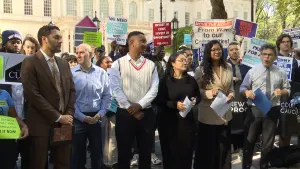More Stories
A professor at the Yale School of Medicine has come up with a time frame as to when we might see an end to the spread of COVID.
"As soon as the pandemic started, we wanted to know when it would end," said Professor Caroline Zeiss.
Zeiss has been busy in the lab working on tests and using numerical data collected from controlled experiments for the last year and a half to arrive at the conclusion that the endemic stage of COVID could be two years away.
Meaning there will be less chance of spreading the virus.
"It could well go on up to another four years. Some of our estimates even go beyond that but the median was two years from now," said Zeiss.
Zeiss' study shows that vaccination and natural exposure bring the population to a broad immunity that pushes COVID to an endemic status.
"What we're seeing now is this transition phase where we're more or less living a normal life but we keep having peaks. Fairly frequent peaks that are regionally localized," said Zeiss.
Zeiss says the disease still has the potential to really harm people who are susceptible. She is hoping history repeats itself. The Russian Flu of the late 1800s killed about 1 million people around the world. That coronavirus was found in cattle and is now one of the common cold viruses.
But Zeiss says the endemic depends on what happens in the rest of the world and if there are more variants.
More from News 12
2:34

Guide: Safety tips to help prevent home burglaries
2:19

Guide: Safety measures to help prevent fires and how to escape one
2:40

Mayor's budget cuts: A controversial solution amidst immigration crisis
2:07

Tips on how to avoid confrontation with sharks while swimming in the ocean
2:33

5 tips to prevent mosquito bites and getting sick from viruses
2:39
